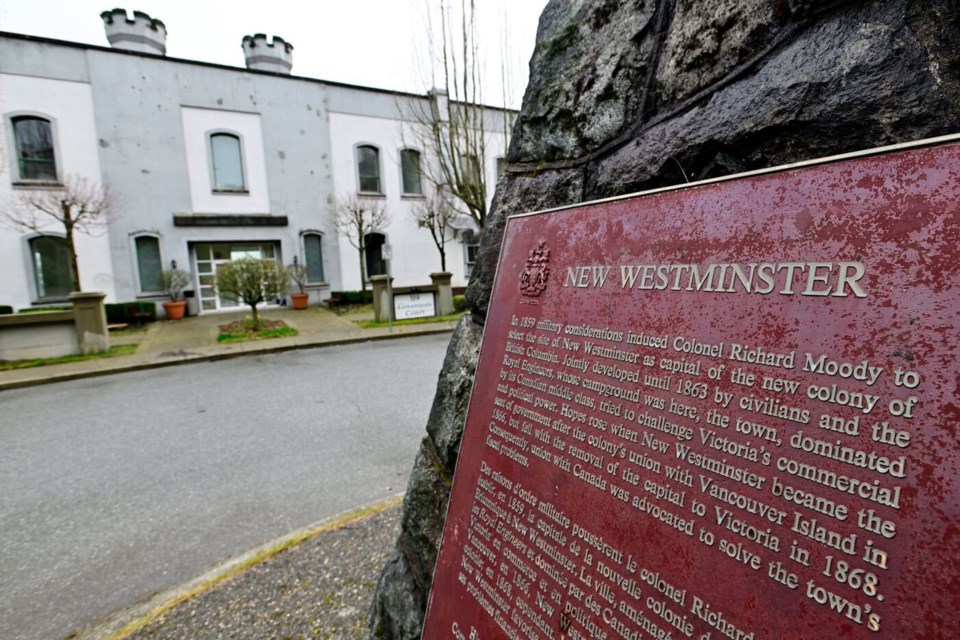Ground-penetrating radar will be needed to rule out the presence of buried bodies before a proposed hotel ever sees the light of day on the former BC Penitentiary site in New Westminster.
Governors’ Court Holdings Inc. wants to build a three-storey, 68-unit hotel next to the 1901 gatehouse building at 319 Governors Ct. The proposed Heritage Hotel would be a Marriott property.
But, before that happens, the owners need to get approval from the city and confirm whether any bodies – including those of Indigenous prisoners – may have buried on the site.
“We just want to be sure that there are no graves in our part of that land, that parcel,” Vikram Bajwa told the Record.
Bajwa, a director and shareholder with Governors’ Court Holdings Inc., said he’s written to Prime Minister Justin Trudeau seeking $500,000 to conduct deep-penetrating radar at the former BC Pen’s old gatehouse site. With many Indigenous children’s bodies having been uncovered at residential schools, he said the company is seeking support to confirm whether any bodies may be buried at the site.
“There were Indigenous prisoners held in this complex,” he wrote.
In August 2021, the federal government said $83 million would be added to an existing $27-million program to fund searches of burial sites and commemorate the children who died at residential schools.
According to Bajwa, the land surveyor has indicated an area of about 30,000 square feet needs to be scanned, excluding the existing building. He said a deep-penetrating radar is the type of technology being used at former residential school sites and would confirm if bodies were buried on the former prison site.
Bajwa said the presence of bodies wasn’t something the owners thought about when buying the site, but the issue came to the forefront with the discovery of graves at residential school sites across Canada.
What was Boot Hill? A history of the BC Penitentiary cemetery
In 2016, the city of New Westminster created a task force to plan for the restoration and preservation of the BC Penitentiary Cemetery – commonly known as Boot Hill. The BC Pen, which operated as a maximum security facility for 102 years, opened in 1878 and was decommissioned in 1980.
“During this time, a cemetery was established within the grounds of the penitentiary for interment of those inmates who, upon their demise, were never claimed by their families,” said an April 2016 staff report. “The cemetery officially opened in 1913, but was probably already in use in 1912. During the cemetery’s early years, records were not carefully taken or preserved and are unreliable. Most graves are marked by small concrete markers identified only with the inmates’ prison number.”
According to the report, the first officially recorded interment took place in 1913 but it’s believed some inmates were buried in unmarked graves as early as 1912. The cemetery is located in the Glenbrook Ravine Park lands, on the western edge of the Glenbrook Ravine.
The cemetery is part of a 13-acre parcel of land that was ceded to the city (later becoming Glenbrook Ravine Park) during the planning stages of the Fraserview development, said the report.
While inmates’ bodies were buried in the area where the cemetery is now located, Governors’ Court Holdings Inc. wants to ensure prisoners weren’t buried on the site being proposed for redevelopment.
“There were a lot of unmarked graves in the park there,” Bajwa said. “We had our lawyer suggest that we must do that, otherwise it could be an issue ... We don’t have a choice.”
Because of its heritage aspects, Bajwa believes the project should qualify for federal funding to determine if any bodies are buried on the site.
“You cannot do a heritage project if you find bodies there,” he said. “That’s why we ordered that deep radar.”
Bajwa said Governors’ Court Holdings Inc.’s lawyers and Marriott International have both said it’s important to do a further investigation into whether any bodies were buried on the site.
“We cannot spend millions of dollars in coming up with that project unless we do a deeper dive,” he said.
Burials unlikely
Rob McCullough, the city’s manager of museums and heritage services, said he has never heard or read of any additional burials on the BC Pen properties, beyond the cemetery, and said the possibility of additional burial sites was never raised at the task force meetings. He said he followed up with a former chaplain who worked with BC Corrections, who had also not heard of any additional burials.
“I think it is unlikely there are burials on the site of the gatehouse property but I cannot be 100% conclusive on this,” he said.
McCullough said his opinion is based on some facts about the use of the former B.C. Penitentiary. He said the Boot Hill cemetery across the Glenbrook Ravine was used from 1913 through 1968; prior to that time, he said deceased inmates were buried at the Douglas Road Cemetery on the New Westminster Secondary School site.
McCullough said the site of the proposed hotel was the gatehouse for the Pen.
“It was built in 1924, much later than the original building, placing it downhill and outside the walls of the BC Pen,” he explained. “This space was a fairly open and publicly visible area of the site. If burials were taking place at the Pen prior to 1913, I don’t believe it would have happened in this area.”
McCullough stressed that his opinion about the likelihood of bodies being buried on the gatehouse property is not conclusive, as it’s not based on an exhaustive review of the historic record.
“My response should not influence the developers’ decision to exercise due diligence by undertaking their own study,” he said in an email to the Record.
Follow Theresa McManus on Twitter @TheresaMcManus
Email [email protected]



